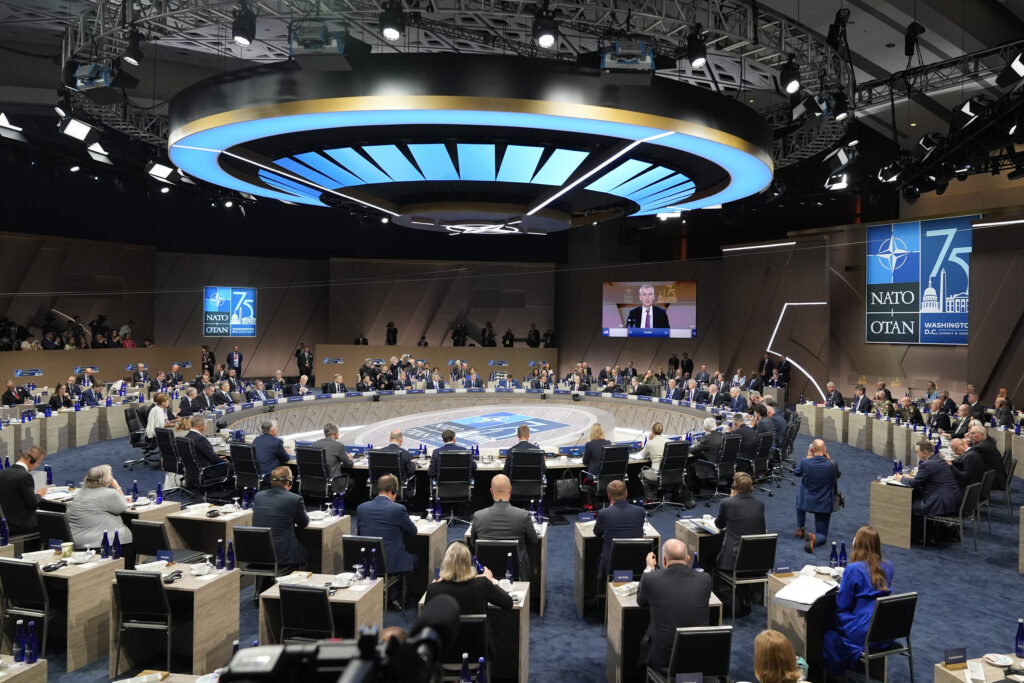European allies in NATO are stepping up their military spending, just as Donald Trump wanted. They’re pointing to common interests, such as concerns over China. They’re creating American jobs by buying U.S. weapons.
In words, deeds and arms deals, leaders of the United States’ partners in NATO are making the case for the military alliance in ways likely to appeal to the presumptive Republican presidential nominee. Even if their actions aren’t necessarily directly tied to Trump’s prodding, the allies are casting them in terms he would approve of — and maybe take credit for.
It’s not clear what Trump would do about U.S. participation in NATO if elected. He’s shrugged off questions from reporters even as President Joe Biden has cast him as a threat to the 75-year-old Western military alliance.
But European leaders are worried. With Russia intensifying missile attacks on cities in Ukraine, a democracy in the heart of Europe, the battle to keep the U.S. in NATO is far more than gamesmanship for European partners. For some, it’s existential.
“If Ukraine loses, my country’s next. That’s clear,” Lithuanian Foreign Minister Gabrielius Landsbergis said during the NATO summit in Washington this past week.
His government is raising taxes to keep up with an urgent push, shared by the majority of European NATO members, to strengthen military capability in response to Russia’s war in Ukraine.
At the summit, NATO Secretary-General Jens Stoltenberg made a point of saying that allies had gotten Trump’s message, with a record 23 of the 32 now spending at least the agreed-upon 2% of their gross domestic product on their militaries.
“The United States has been understood. Allies have acted,” Stoltenberg declared in response to one of many questions about a possible Trump withdrawal from NATO.
Stoltenberg and most others had previously said that it was largely Russia’s 2022 invasion of Ukraine that had unleashed security spending by NATO members in Europe. Indeed, in 2021, only six allies had met the spending target.
The message from Europe, as it makes the case for the country with the biggest military and economy to stay engaged: The U.S. is good for European allies and NATO. And NATO and European allies are good for the U.S. And a Europe that’s safe and stable is a great market for the U.S.
“This defense of Europe is not only defense tied with values — it is, it’s the alliance, it’s democracy, it’s values. But you know, it’s business,” Jacek Siewiera, the head of Poland’s national security bureau, said in an interview with The Associated Press before the summit.
Lithuanian Defense Minister Laurynas Kasčiūnas ticked off the priorities that his country would share with Trump if he returns to the White House — making European defense more self-reliant, buying more U.S. weapons and thus generating more business for the U.S. arms industry, confronting perceived security threats to the West from China, and sanctioning Iran.
“He’s a deal-maker,” Kasčiūnas said during a panel discussion at the summit. “I think we should sit, calm down, and if he will win — find a deal.”
With the U.S. election in turmoil following Biden’s poor debate performance and struggles since to prove he’s capable of serving another four years, European officials need to maintain a delicate balance. They stress publicly that they will work with whoever wins November’s elections, not wanting to be seen as weighing in on U.S. politics by saying they are worried about Trump or offending Biden by overtly preparing for another Trump presidency.
Trump has caused alarm by speaking admiringly of Russian President Vladimir Putin, even calling his invasion of Ukraine “genius,” and disparaging NATO, a mutual-defense pact signed in 1949 as the West confronted the Soviet Union in the Cold War.
U.S. presidents and lawmakers, including Biden, have warned Europe for decades, especially as European military spending sagged after the 1991 collapse of the Soviet Union, that it had to do more to share the financial and military responsibilities of NATO.
But Trump has warned more often and more loudly — and during the current campaign he has threatened to invite Russia to attack NATO allies that are not spending enough on their militaries.
“I just want them to pay their bills. We’re protecting Europe. They take advantage of us very badly,” he told Fox News Radio last week as Biden and NATO leaders gathered in Washington. He acknowledged that European defense spending was, in fact, up sharply.
Although not as openly as Hungarian leader Viktor Orban, who visited Trump at Mar-a-Lago after the NATO summit, European officials have been working to build relationships with the Trump camp, former diplomats say.
European officials make a point of visiting the factories in U.S. cities and towns that make the weapons their countries are buying or drop mention of them into their conversations, stressing the contribution to the U.S. economy.
Siewiera, the Polish security official, remembers Trump’s first term as prosperous for Poland. It was then that his government began investing heavily in U.S. arms including HIMARS rocket-launcher systems, Patriot air defense systems, F-35 fighter jets and Abrams tanks.
“President Trump was right when he harangued us,” Poland Foreign Minister Radosław Sikorski said at an event at a Washington think-tank on Friday. “So credit where credit is due. Partly.”
Ultimately, said Daniel Fried, a former U.S. ambassador to Poland, now at the Atlantic Council research center, Trump “likes to be a winner.”
“If Trump claims credit and thereby continues U.S. support for NATO because he saved it, that’s a narrative I would encourage Europeans to accept,” Fried said.
(AP)











